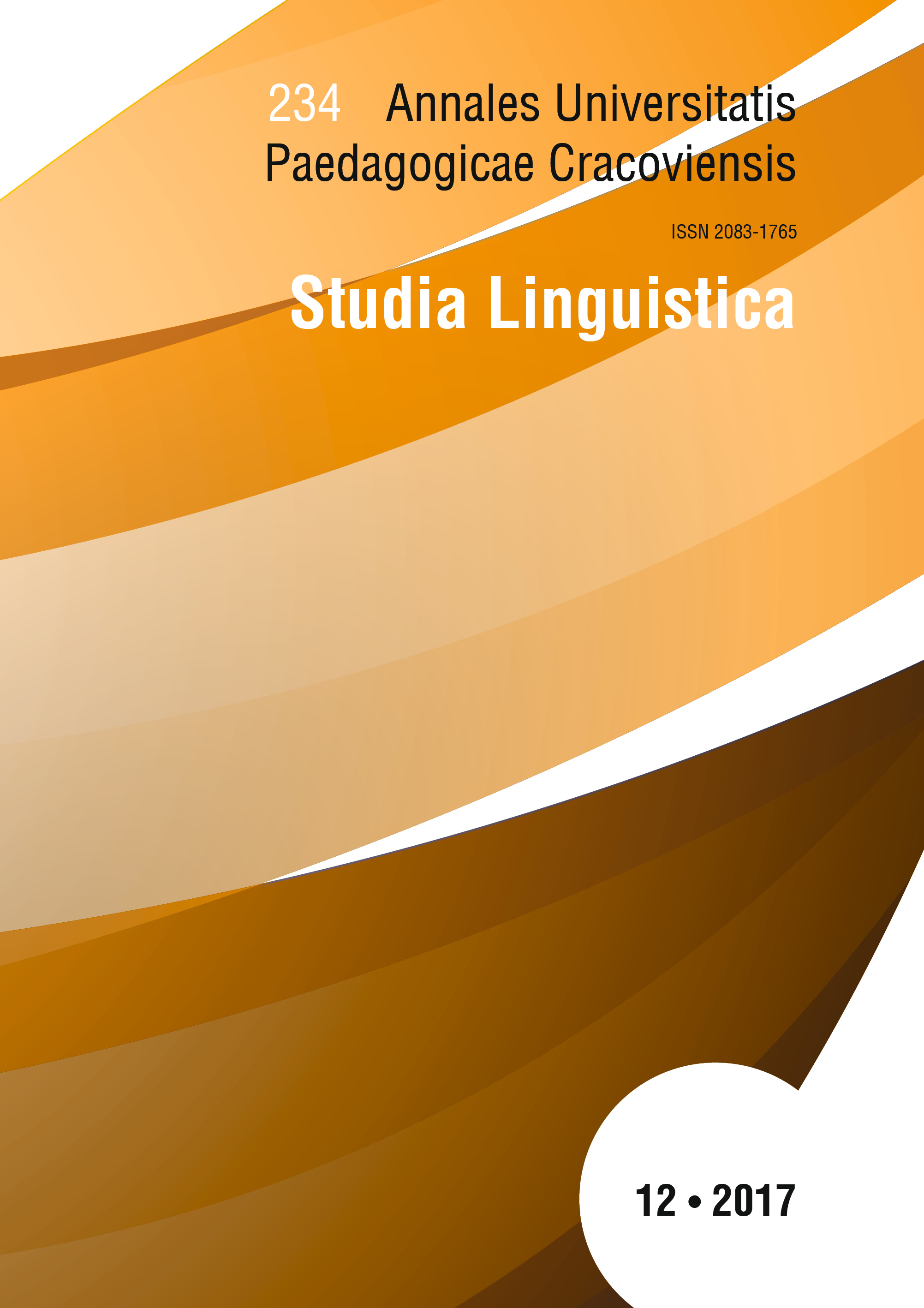The choice and indefiniteness as semantic features of the adjective dowolny ‘any’
Main Article Content
Abstract
The article discusses syntactic and semantic features of the adjective dowolny ‘any’. The adjective in question refers to an object that the speaker intends to choose from a set of many elements. However, it doesn’t matter which object will be chosen. In the moment of choice the object loses its feature of “anyness”. The nominal phrase with the adjective dowolny represents indefinite description and this phrase can occur only in non-declarative sentences. The adjective dowolny is semantically related to the pronouns with the morpheme -kolwiek ‘any’.
Downloads
Article Details
Author, submitting a text to the editorial board of the journal “Annales Universitatis Paedagogicae Cracoviensis. Studia Linguistica", certifies that the content of the article has not been published so far and that the work does not violate in any way the copyright or related rights of other person, as well as other rights of third parties, and that no one's rights to the work (or any part thereof) have been missed. After signing the contract, the property rights to the published materials are transferred to the University of the National Education Commission, Krakow.
“Annales Universitatis Paedagogicae Cracoviensis. Studia Linguistica” is an open access journal, and all its content is made available free of charge to users and institutions under the Creative Commons CC-BY-NC-ND 4.0 license (attribution, non-commercial use, no derivative works). Under this license, the authors agree that their work may be lawfully reused for any purpose, except for commercial purposes, without the prior consent of the author or publisher. Everyone can read, download, copy, print, distribute and process these works, provided that the author's marking and the original publication place are correct. Published texts may not be used to create derivative works (e.g. to translate and publish in another language without the consent of the publisher). This is in line with the BOAI (Budapest Open Access Initiative) definition. "Studia Linguistica" does not charge for submitting or processing articles.
References
Andrejewicz U., 2001, Polskie zaimki rzeczowne w ujęciu gramatycznym, Białystok.
Google Scholar
Błaszczak J., 1999, ‘-Kolwiek’ pronouns in Polish: negative polarity items or free choice items or both?, [w:] Beiträge der Europäischen Slavistischen Linguistik (Polyslav) 2, red. K. Böttger, M. Giger, München, s. 51–62.
Google Scholar
Bogusławski A., 1998, The semantic primitives ‘someone’, ‘something’ and the Russian contradistinction -нибудь vs. -то, [w:] Funktionswörter im Polnischen, red. M. Grochowski, G. Hentschel, Oldenburg, s. 33–53.
Google Scholar
Cyra K., 2001, Czy rzeczywiście „ktokolwiek” znaczy ‘każdy’? „Polonica” XXI, s. 69–76.
Google Scholar
Danielewiczowa M., 1998, O szczególnych właściwościach 1.os. l. poj. czasu teraźniejszego pewnych czasowników mentalnych, „Prace Filologiczne” XLIII, s. 119–129.
Google Scholar
Dróżdż-Łuszczyk K., 2006, Studium konstrukcji elektywnych we współczesnej polszczyźnie, Warszawa.
Google Scholar
Grochowski M., 1997, O strukturze semantycznej zdań z zaimkiem „ktokolwiek”, „Polonica” XVIII, s. 103–113.
Google Scholar
Grochowski M., 2000, Funkcja intratekstualna leksemów a ich cechy gramatyczne (analiza wyrażenia „wszelki”), „Poradnik Językowy” 5, s. 1–10.
Google Scholar
Grzegorczykowa R., 1972, Funkcje semantyczne tzw. zaimków nieokreślonych w języku polskim, „Prace Filologiczne” XXII, s. 63–83.
Google Scholar
Grzegorczykowa R., 1987, Zaimki uogólniające a mechanizmy tworzenia zdań ogólnych, „Prilozi MANU” XII, 2, s. 133–140.
Google Scholar
Grzegorczykowa R., 2010, Wprowadzenie do semantyki językoznawczej, Warszawa.
Google Scholar
Karolak S., 1987, O nieokreśloności, [w:] Studia gramatyczne bułgarsko-polskie II. Określoność / nieokreśloność, red. V. Koseska-Toszewa, J. Mindak, Wrocław, s. 41–64.
Google Scholar
Kiklewicz A., 1993, Dlaczego „ktokolwiek” znaczy ‘każdy’, a „ktoś” znaczy ‘nikt’? „Poradnik Językowy” 9–10, s. 518–523.
Google Scholar
Kiparsky P., Kiparsky C., 1971, Fact, [w:] Progress in Linguistics, red. M. Bierwisch, R. Hei- dolph, The Hague, s. 143–173.
Google Scholar
Laskowski R., 1998, Zagadnienia ogólne morfologii, [w:] Gramatyka współczesnego Języka Polskiego. Morfologia, red. R. Grzegorczykowa, R. Laskowski, H. Wróbel, Warszawa, s. 27–86.
Google Scholar
Milewski T., 1965, Językoznawstwo, Warszawa.
Google Scholar
Nagórko A., 1996, Zarys gramatyki polskiej, Warszawa.
Google Scholar
Padučeva E.V., 1992, Wypowiedź i jej odniesienie do rzeczywistości (referencyjne aspekty znaczenia zaimków), Warszawa.
Google Scholar
Růžička R., 1973, Indefinite pronouns and quantification (кто-тo and кто-нибудь in modern standard Russian), [w:] Liczba, ilość, miara, red. Z. Topolińska, M. Grochowski, Wrocław, s. 49–75.
Google Scholar
Szumska D., 2007, Przymiotnik jako przyłączone wyrażenie predykatywne. Analiza formalizacji struktur propozycjonalnych w warunkach predykacji niezdaniotwórczej, Kraków.
Google Scholar
Szupryczyńska M., 1980, Opis składniowy polskiego przymiotnika, Toruń.
Google Scholar
Topolińska Z., 1977, Wyznaczoność (tj. charakterystyka referencyjna) grupy imiennej w tekście polskim. II. Argumenty niescharakteryzowane, grupy generyczne, „Polonica” III, s. 59–78.
Google Scholar
Topolińska Z., 1984, Składnia grupy imiennej, [w:] Gramatyka współczesnego języka polskiego. Składnia, red. Z. Topolińska, Warszawa, s. 301–389.
Google Scholar
Wajszczuk J., 2010, Functional class (so called „part of speech”) assignment as a kind of meaning-bound word syntactic information, “Cognitive Studies” / “Études Cognitives” 10, s. 15–33.
Google Scholar
Wierzbicka A., 1969, Dociekania semantyczne, Wrocław.
Google Scholar
Wierzbicka-Piotrowska E., 2011, Polskie zaimki nieokreślone. Wybrane zagadnienia semantyczne, syntaktyczne i pragmatyczne, Warszawa.
Google Scholar
Wróbel H., 2001, Gramatyka języka polskiego, Kraków.
Google Scholar
